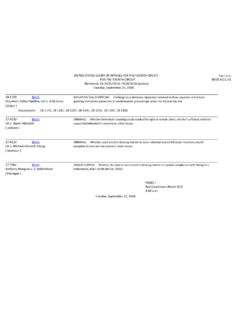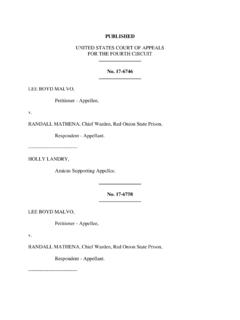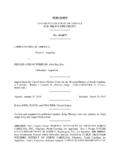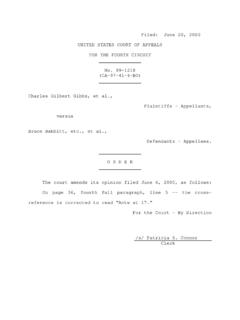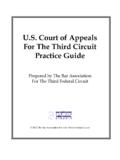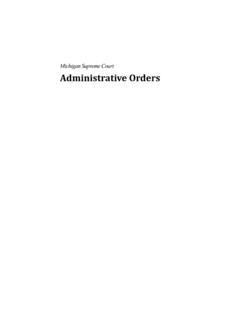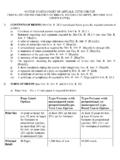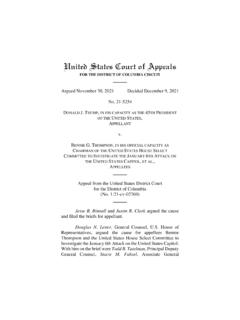Transcription of PUBLISHED - ca4.uscourts.gov
1 PUBLISHED UNITED STATES COURT OF APPEALS FOR THE FOURTH circuit No. 20-6330 UNITED STATES OF AMERICA, Plaintiff - Appellee, v. DONALD L. BLANKENSHIP, Defendant - Appellant. appeal from the United States District Court for the Southern District of West Virginia, at Beckley. Irene C. Berger, District Judge. (5:14-cr-00244-1; 5:18-cv -00591) Argued: September 22, 2021 Decided: December 7, 2021 Before NIEMEYER, DIAZ, and QUATTLEBAUM, circuit Judges. Affirmed by PUBLISHED opinion. Judge Niemeyer wrote the opinion, in which Judge Diaz and Judge Quattlebaum joined. ARGUED: James McCall Cagle, Charleston, West Virginia, for Appellant. Thomas Ernest Booth, UNITED STATES DEPARTMENT OF JUSTICE, Washington, , for Appellee. ON BRIEF: Nicholas L. McQuaid, Acting Assistant Attorney General, Robert A. Zink, Acting Deputy Assistant Attorney General, Criminal Division, UNITED STATES DEPARTMENT OF JUSTICE, Washington, , for Appellee.
2 2 NIEMEYER, circuit Judge: In this proceeding under 28 2255, Donald Blankenship seeks to vacate his conviction for conspiring to willfully violate coal mine safety standards, alleging that the federal prosecutors violated his due process rights in failing to produce documents favorable to him before trial, in violation of Brady v. Maryland, 373 83 (1963) (requiring the government to disclose exculpatory evidence), and Giglio v. United States, 405 150 (1972) (requiring the government to disclose impeaching evidence). Following an explosion at Massey Energy Company s Upper Big Branch coal mine in Montcoal, West Virginia, that killed 29 miners, Blankenship who was at the time of the explosion the Chairman of the Board and CEO of Massey was charged with and convicted of conspiring to willfully violate mandatory federal mine safety and health standards, in violation of 30 820(d) and 18 371.
3 The trial evidence centered on the allegation that Blankenship had willfully failed to address numerous notices of mine safety violations that Massey had received, favoring coal-mine production and profits over safety. Following the trial and in response to Blankenship s ongoing requests, the government produced documents to Blankenship that it had not produced before trial and that it should have produced under applicable Department of Justice ( DOJ ) policies. Indeed, an internal DOJ review concluded that prosecutors in the case failed, as DOJ policies require, to develop a process for review of pertinent information to ensure that discoverable information [was] identified. The suppressed documents fell broadly into two categories: (1) memoranda of interviews conducted of seven Massey employees and 3 (2) internal emails and documents of the Mine Safety and Health Administration ( MSHA ) showing, among other things, some MSHA employees hostility to Massey and Blankenship.
4 The district court, recognizing that the documents were improperly suppressed, concluded nonetheless that they were not material in that there was not a reasonable probability that they would have produced a different result had they been disclosed before trial. The court stated that after thorough review, nothing ha[d] been presented to undermine confidence in the jury s verdict. It accordingly denied Blankenship s 2255 motion. Having given the record a close review ourselves, we reach the same conclusion as the district court. Accordingly, we affirm. I Before the explosion at the Upper Big Branch mine, which occurred on April 5, 2010, Massey had repeatedly been cited with respect to that mine for violations of the Federal Mine Safety and Health Act of 1977, 30 801 et seq. Indeed, in the 15 months prior to the explosion, it received the third-most serious safety citations of any mine in the United States.
5 In November 2014, a federal grand jury returned an indictment against Blankenship, who by then had retired from Massey, and the grand jury s superseding indictment alleged that from 2008 through April 9, 2010, Blankenship had, in connection with the Upper Big Branch mine, conspired to willfully violate federal mine safety and health standards, in 4 violation of 30 820(d) and 18 371. It also charged that Blankenship had conspired to defraud the United States by impeding the MSHA in the enforcement of mine safety and health laws; had made false statements to the Securities and Exchange Commission, in violation of 18 1001(a) and 2; and had engaged in securities fraud, in violation of 15 78ff, 17 , and 18 2. At trial, the government s proof focused mainly on its allegation that Blankenship had conspired with other Massey employees to willfully violate mine health and safety standards in order to produce more coal at a lower cost.
6 It presented evidence that Blankenship had received daily reports showing the numerous citations for safety violations at the mine. Bill Ross, one of Massey s senior safety officials, testified about his concern over the number and type of citations that Massey had been receiving and how his concerns had been communicated to Blankenship. For example, in a June 2009 memorandum prepared for Blankenship by a Massey in-house attorney, Blankenship was advised that Ross believed that [t]he attitude at many Massey operations is if you can get the footage, we can pay the fines. The memorandum noted further that Ross s observation was that the company would rather get violations, including unwarrantable actions, than wait for approval from the MSHA, which show[ed] a lack of concern for both safety and the law. The evidence also showed that Blankenship had fostered this lax attitude toward safety by directing mine supervisors to focus on running coal rather than complying with safety standards.
7 In particular, the Massey executive in charge of managing the Upper Big Branch mine, Chris Blanchard, testified (pursuant to a cooperation agreement) that 5 Blankenship had made statements to him to the effect that safety violations were the cost of doing business the way he wanted it done, taking from his various conversations with Blankenship that Blankenship saw it as cheaper to break the safety laws and pay the fines than to spend what would be necessary to follow the safety laws. Blanchard agreed that Blankenship had continually pressured him on profit and costs but rarely, if ever, said anything about the hundreds of safety law violations at [the Upper Big Branch mine]. According to Blanchard, Blankenship s policy was to invariably press for more production even at mines that he knew were struggling to keep up with safety laws.
8 Indeed, even though Massey employees advised Blankenship that the lack of adequate staff was a key factor in the high number of safety violations at the Upper Big Branch mine, Massey reduced staff there less than two months before the accident, a decision Blankenship would have had to approve given his close supervision of mine operations and staffing. In addition to the testimony of Ross and Blanchard, the government also presented testimony from numerous coal miners about how they were required to work in unsafe conditions at the mine. Blankenship s primary defense at trial was that none of the violations of safety standards had been willful. He acknowledged that he had pushed his subordinates to increase coal production while keeping costs down, but he maintained that the evidence also showed that he took safety seriously and had led a successful initiative in 2009 to cut down citations at all the Massey mines, including the Upper Big Branch mine.
9 To present his defense, Blankenship s counsel vigorously cross-examined both Ross and Blanchard, 6 presenting numerous Massey documents through them in support of his defense. Blankenship did not, however, call any witnesses, even though he had, in a pretrial filing, designated several high-level Massey employees as among those whom he might call to testify on his behalf. The jury, after deliberating for approximately two weeks, convicted Blankenship of the misdemeanor offense of conspiring to willfully violate mine safety and health standards and acquitted him on the remaining counts. The district court sentenced Blankenship to 12 months imprisonment and imposed a $250,000 fine. On appeal , we affirmed the district court s judgment, United States v. Blankenship, 846 663 (4th Cir. 2017), and the Supreme Court denied Blankenship s petition for a writ of certiorari, Blankenship v.
10 United States, 138 S. Ct. 315 (2017). Following his conviction, Blankenship continued to request evidence that he believed the government had suppressed both before and during trial, despite his repeated requests and motions for the evidence. The government had responded to his earlier requests by stating that it had complied with its discovery obligations. But in response to Blankenship s post-trial requests, the United States Attorney s Office began providing Blankenship with documents it had not previously produced, having by then concluded that its earlier production of documents had not complied with DOJ policies governing discovery. The documents belatedly produced fell into two broad categories. First, the government produced memoranda prepared by federal law enforcement agents summarizing their interviews of seven individuals who had been high-ranking Massey 7 employees during the time period charged in the indictment (2008 to 2010).
